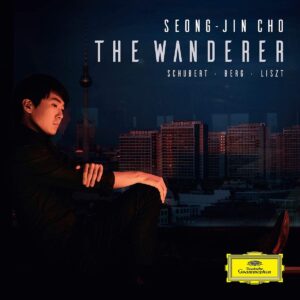Deutsche Grammophon must love Liszt’s B minor sonata, having released recordings of the work by (in alphabetical order) Pierre-Laurent Aimard, Martha Argerich, Daniel Barenboim, Andor Foldes, Hélène Grimaud, Diana Kasco, Yundi Li, Ivo Pogorelich, Maurizio Pollini, Mikhail Pletnev, Daniil Trifinov, Tamas Vasary, Yuja Wang, and Krystian Zimerman. And now Seong-Jin Cho.
Along with Aimard and Grimaud, Cho becomes the third DG artist to couple the Liszt and the Alban Berg sonatas. However, Schubert’s Wanderer Fantasy is the composition from which this release derives its title and unifying theme: the Schubert, Berg, and Liszt are each based on single motives from which all themes are developed.
Cho’s ardent and assertive reading of the Berg sonata emphasizes sonority and sweep, with a development section that veers on pushing past the proverbial speed limit. It differs from the conscientious polyphonic contouring we hear from Pollini and Mitsuko Uchida, and from the underrated Peter Donohoe recording. If Cho’s Wanderer Fantasy doesn’t rise to the impetuous high points of Lang Lang’s extroverted live 2003 Carnegie Hall traversal (also on DG) his superior rhythmic control and assiduous tempo relationships match Pollini, Sviatoslav Richter, and Murray Perahia for symphonic discipline. Furthermore, Cho’s iron-clad technique allows him to sail through the first section’s climactic octaves without pulling back the tempo, not to mention his clean and exultant navigation of the fugal finale’s gnarlier textures.
Cho’s Liszt sonata may not match Marc-André Hamelin’s linear awareness, Claudio Arrau’s large-scale theatricality, Yundi Li’s subtle transitions, the electrifying dynamic contrasts of Argerich and Zimerman, or Joseph Moog’s volatile mood shifts. Yet it’s extremely well played, and full of individual touches, such as Cho’s parsing of the first extensive octave passage, or his transparent interplay of lines in the lyrical D major theme and in its B major recapitulation. The Fughetta, however, seems studio-bound in its rigidly articulated dotted rhythms, but the octave onslaughts up ahead convey a narrative attitude that is cumulative rather than exhibitionist in effect. All told, a meaty program that admirably showcases Cho’s ripening artistry.
































